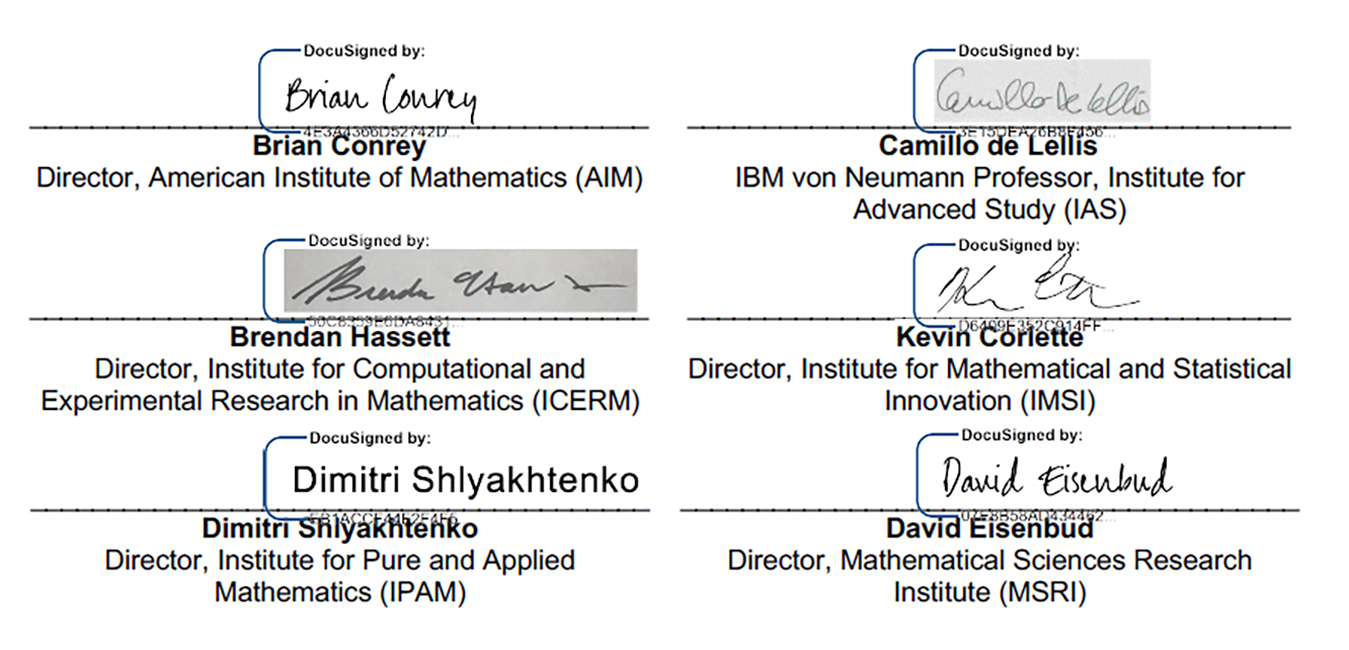Permalink to this page: https://www.msri.org/covid19advocacy
View letter as images: Page 1 of 2 / Page 2 of 2
Submit ideas: See the form at the bottom of this page, or access it directly here. You may also send ideas via email to covid19response@msri.org - please include your contact information and/or attribution.
OPEN LETTER: April 24, 2021
We are writing to express our concern about the future of the profession and the career paths of early career mathematical scientists. Our focus is on the impact of COVID on the careers of researchers with children and those who find themselves as caregivers (most often women). Additionally, with conferences cancelled and chances for in-person interaction severely diminished, almost no new collaborations have been started. Existing ones have often been halted. Time and space slated for research have been blended with people’s personal time and space. The mathematical sciences thrive on the continuing influx of new ideas and the pandemic has slowed this flow to a small drip. In addition, the shift of teaching and research to remote settings, typically at home, has increased the burden of balancing work and life obligations, and this stress has been felt acutely by our colleagues who are also caregivers to children and aging relatives. Our goal in this letter is to help ensure the good health of the profession by suggesting ideas that could alleviate some of the damaging effects of the pandemic on those in our field who are most vulnerable.We would like this letter also to contribute to a future where mathematicians currently employed in temporary positions, and future job applicants, will have a chance to flourish and participate in the growth of the discipline.
We believe that the following measures, some already under implementation, can be especially helpful in addressing this crisis:
- Investment by universities, colleges, and funding agencies in extending, on a case-by-case basis,the contracts of colleagues in temporary positions to offset the loss of productivity and job opportunities during the crisis.
- Efforts by promotion committees to extend the promotion and tenure clock for all junior faculty without the need for these faculty to disclose situations in their home life that may have caused a slowdown in their research, struggles in their transition to remote teaching, or lapses in their fulfillment of service obligations.
- Rebalancing by universities and colleges of teaching and service obligations to allow more time for research. On a temporary basis, departments can rethink the manner in which teaching duties are met and committee assignments are done.
- Inviting (but not requiring) candidates applying for academic positions, promotions, or grants to document the impact of COVID on their research, teaching, service, and mentoring. To maximize the effectiveness of this recommendation, we suggest that it extend over several years to address the likely long-term impacts of the pandemic.
- Awareness by hiring and promotion committees that, in terms of publication records, the gaps caused by the current situation might become most apparent two years after the end of the pandemic. Taking into account arXiv postings and professional invitations rather than only focusing on publications can be considered.
We encourage departments to share ideas about additional constructive measures by posting to the following website: https://www.msri.org/covid19advocacy. [Note: see form on bottom of this page.]
We and our colleagues have not experienced the crisis equally. In academia, untenured faculty, women,and caregivers have been disproportionately affected. We are especially concerned that we may disproportionately lose talented women mathematicians and mathematicians from groups historically underrepresented in the field during and following this crisis.
The mathematical sciences have made progress in recruiting junior women over the last few years; losing them now would be devastating. We strive to make similar progress with individuals from traditionally underrepresented groups. We hope that academic institutions and granting agencies can work together toward the common goal to save an endangered generation of mathematical scientists. They represent the future of the profession.

Signatories:
Brian Conrey
Director, American Institute of Mathematics (AIM)
Camillo de Lellis
IBM von Neumann Professor, Institute for Advanced Study (IAS)
Brendan Hassett
Director, Institute for Computational and Experimental Research in Mathematics (ICERM)
Kevin Corlette
Director, Institute for Mathematical and Statistical Innovation (IMSI)
Dimitri Shlyakhtenko
Director, Institute for Pure and Applied Mathematics (IPAM)
David Eisenbud
Director, Mathematical Sciences Research Institute (MSRI)
References:
- Investigating the Potential Impact of COVID-19 on the Careers of Women in Academic Science, Engineering, and Medicine
- The experience of Postdoctoral Women during the COVID-19 pandemic, National Academy of Sciences
- ASPIRE, The National Alliance for Inclusive & Diverse Stem Faculty
- Nature - The career cost of COVID-19 to female researchers, and how science should respond
SUBMIT IDEAS: To submit ideas from your university and/or department of mathematical sciences, please use the following form. Responses will be shared to this page in a timely manner. You may also send ideas via email to covid19response@msri.org - please include your contact information and/or attribution.
Direct link to form: https://forms.gle/feN4YAXczY4RKFKZ9
COMMENTS SUBMITTED:
"One time funding + supplements for research support for grad students or postdocs, either for grad students or postdocs directly affected + needed to extend their positions, or for researchers affected by COVID to be able to support a postdoc or RA working with them on publications." - Rachel Kuske, Department of Mathematics, Georgia Tech (May 12, 2021)
"I applaud the recommended measures. Childcare difficulties have been cited by several of our faculty as impacting their research during the pandemic. On this theme, to these recommendations I might suggest that consideration be given to allowing research funds to partially support childcare. See, for example, [external link]: https://grants.nih.gov/grants/policy/nih-family-fr...." - Kevin M. Pilgrim, Department of Mathematics, Indiana University Bloomington (May 12, 2021)